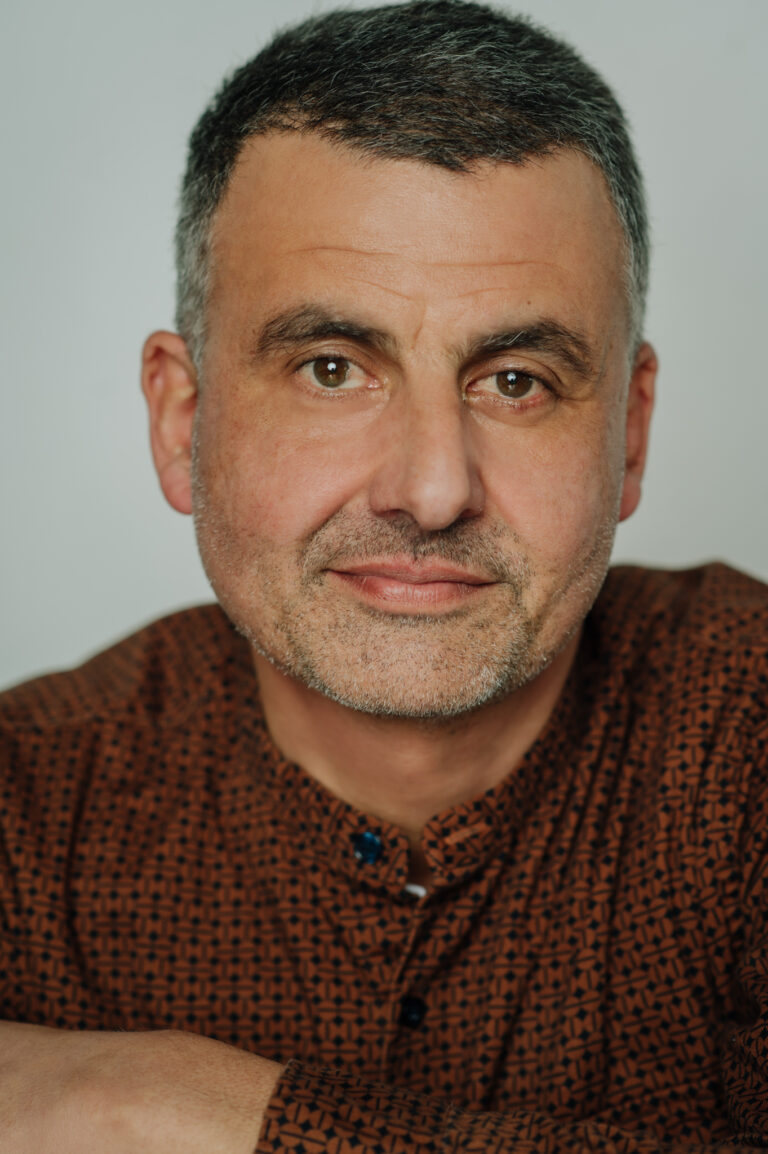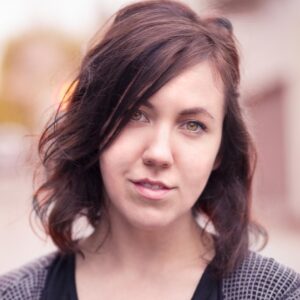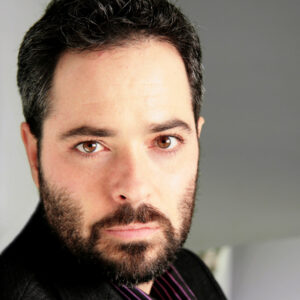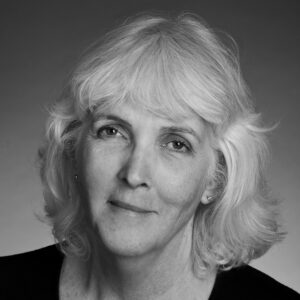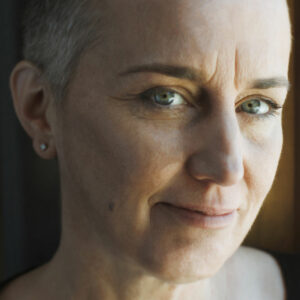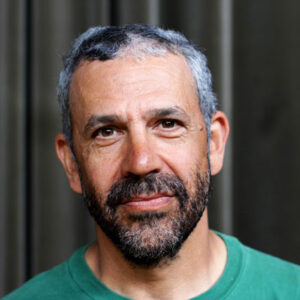Marcus Youssef
Lauréat, 2017
Image : Nom, Titre, Description
01
2017 Lauréat
« Le Prix Siminovitch a une grande importance pour moi et – si je puis dire – pour la communauté théâtrale, à l’échelle de notre pays énormément petit. C’est un engagement extraordinaire envers le théâtre canadien et les artistes de théâtre. Il n’y a tout simplement aucune autre récompense semblable, en termes de prestige et de différence concrète dans la vie des finalistes et des lauréats. Et ceci est particulièrement significatif parce qu’il honore des artistes qui ont atteint la maturité ainsi que le sommet de leur carrière et de leur créativité. C’est aussi le moment où bon nombre d’entre nous commencent à s’interroger sur notre décision de devenir artiste, sur l’importance ou l’utilité de ce choix, et sur ce qui nous attend, nous et notre famille, avec l’âge. Le Prix Siminovitch est un antidote puissant à ces pressions véritables et compréhensibles. Il rend hommage à l’idée que nous sommes en droit de penser qu’il est légitime d’œuvrer comme artiste toute notre vie. C’est le signe d’une culture qui a atteint la maturité. En tant que petit voisin de la puissance dominante, je pense que nous ne devons pas hésiter à nous mythologiser fièrement et sans nous en excuser. C’est précisément ce que le Prix Siminovitch nous permet de faire. »
Marcus Youssef a écrit ou coécrit certaines des pièces canadiennes les plus connues sur le thème de la différence et de l’altérité, dont Winners and Losers, King Arthur’s Night, Leftovers, How Has My Love Affected You?, Ali & Ali, Chloe’s Choice, Everyone, Adrift, Peter Panties, Jabber et A Line in the Sand. Ses œuvres ont été présentées en Amérique du Nord, en Australie et en Europe, et publiées chez Talonbooks et les Playwrights Canada Press. Il a reçu de nombreuses récompenses, parmi lesquelles : le prix Victor-Martyn-Lynch-Staunton du Conseil des arts du Canada; le prix Rio Tinto Alcan pour les arts de la scène; le prix Chalmers; la Silver Commission de l’Arts Club Theatre; le prix de la critique de Vancouver (à trois reprises); une mise en nomination aux Prix littéraires du gouverneur général; de nombreux prix Jessie Richardson, Dora Mavor Moore et META ainsi que de nombreuses autres mises en nomination. Marcus Youssef est le directeur artistique du Neworld Theatre de Vancouver et cofondateur de PL1422, centre de création géré par des artistes. Il est conseiller à la rédaction de la Canadian Theatre Review, membre canadien de l’International Society for Performing Arts et professeur auxiliaire de création littéraire à l’Université de la Colombie-Britannique.
Discours d’acceptation
Ouf. Bonjour. Allô. C’est à peu près tout le français que je suis capable de parler – je viens de la côte Ouest, désolé. D’abord : il n’y a aucune façon de dire ce que je m’apprête à dire sans que ça sonne comme une formule toute faite ou un cliché, mais… ça aurait vraiment pu être n’importe lequel·la des quatre. C’est juste la vérité.
Mes collègues nommé·e·s — Evelyne de la Chenelière, Hannah Moscovitch et Donna-Michelle St. Bernard — sont des artistes canadiennes brillantes, sensibles, lucides, radicales et d’un talent à couper le souffle. Lors de la cérémonie de nomination à Toronto il y a quelques semaines, chacune a prononcé des mots qui m’ont confirmé ce que leur travail m’avait déjà laissé entrevoir : ce sont mes camarades, mes complices dans le choix de cette activité artistique si particulière — un choix que l’extraordinaire générosité d’Elinore et Lou Siminovitch, du Centre national des Arts, de Katherine Siminovitch, de la famille Siminovitch et de leurs très nombreux admirateur·trice·s, partenaires et allié·e·s a jugé digne d’être honoré — pour des raisons profondes et personnelles.
DM, Hannah, Evelyne (qui ne peut pas être avec nous ce soir parce qu’elle travaille en Europe – la vie est dure !) : votre travail visionnaire a profondément inspiré non seulement le mien, mais aussi celui de dizaines d’autres auteur·trice·s canadien·ne·s qui tapent furieusement dans des cafés et des salles de répétition aux quatre coins de ce pays immensément petit. Vous écrivez sur ce qui vous obsède et vous déroute. Vous écrivez en résistance aux pressions d’un système économique et politique mondial qui a une faim insatiable de pouvoir et de profit. Vous écrivez au nom de notre besoin humain fondamental d’authenticité, de réconfort, de risque, de rire, de dissidence et — surtout — de lien. Votre travail est une lumière. Je suis tellement fier·ère d’être ici avec vous.
Comme mes collègues nommé·e·s, et comme tant d’autres écrivain·e·s et artistes, j’écris sur des choses que je ne peux pas expliquer, et sur des questions que notre culture semble parfois avoir peur d’affronter. C’est peut-être pour cela que j’ai écrit des comédies satiriques sur la guerre contre le terrorisme, une pièce semi-expérimentale sur le capitalisme, l’amitié et la compétition, une pièce pour adolescent·e·s sur une jeune immigrante musulmane qui porte le hijab, un spectacle tiré des journaux intimes légués par ma mère avec qui j’étais brouillé·e, des collaborations avec un artiste dont la vie inclut la trisomie 21, et une adaptation d’un roman égyptien des années 1960 sur le nihilisme, transposé dans le Vancouver contemporain.
Je suis l’enfant d’un père égyptien et d’une mère anglo-américaine. En tant qu’auteur·trice métis·se ayant grandi en Amérique du Nord dans les années 1970 et 1980 — à une époque où l’identité mixte n’était pas encore « officielle » — je crois que mes parents m’ont transmis un cadeau extraordinaire : celui de m’identifier non pas comme l’un ou l’autre, mais comme un·e être entre les deux.
Ce n’est pas un hasard si les frontières sont militarisées et instrumentalisées. Une frontière est un entre-deux avec ses propres règles autoritaires et strictement codifiées. C’est aussi l’endroit où l’on rencontre l’autre : l’autre nation, l’autre culture, l’autre langue, l’autre genre, l’autre esprit, l’autre récit, l’autre système nerveux, l’autre corps. C’est l’espace entre chacun·e de nous.
Je crois que c’est en partie pour cela que j’ai autant coécrit. Environ la moitié de mes pièces ont été écrites en collaboration avec une grande diversité de collègues. C’est un fait qui me rend parfois timide, voire un peu imposteur·trice. Mais, pour le meilleur ou pour le pire, je suis obsédé·e par l’espace entre moi et les autres — le mariage biculturel de mes parents était en grande partie malheureux, c’est peut-être une des raisons — et par la quête d’une idée, d’un langage ou d’un récit nouveau qui pourrait rassembler des quêtes de vérité différentes mais profondes, et fusionner ce qui était deux en un seul.
Je crois que cette idée — ou ce principe — est aussi inscrite dans l’ADN même de ce prix. Lou était un scientifique de renommée mondiale. Elinore, une dramaturge engagée et radicale. Leur mariage, dans sa collaboration, était une frontière entre deux vocations profondément ancrées, un espace qui n’était ni l’une ni l’autre, mais l’entre-deux.
Lors de la cérémonie de nomination à Toronto, Lou Siminovitch – qui a 97 ans et demi, soit dit en passant, et une vivacité d’esprit intimidante – m’a dit que lorsqu’on lui a annoncé la création d’un prix en son nom et en celui d’Elinore, il avait été surpris d’être convoqué à l’étage supérieur de la Banque de Montréal. Parce que, selon ses propres mots : « Je ne connais rien à l’argent ni à la finance. Qu’est-ce qu’ils pouvaient bien me vouloir ? » Plus tard, à la même cérémonie, sa fille Kathy m’a confié que Lou et Elinore étaient, en réalité, des socialistes convaincus. Des radicaux, dont les immenses contributions à la société canadienne sont aujourd’hui reconnues par un prix prestigieux, financé et soutenu par des individus et des familles fortuné·es qui les admirent. Encore un exemple véridique, magnifique, de cet entre-deux bien réel.
Quand j’enseigne le théâtre et l’écriture à mes étudiant·es, je leur dis souvent : l’art de l’écriture dramatique et de la création théâtrale est, par nature, marginal et entre-deux. Pour quelqu’un qui est extérieur au milieu, ça peut sembler être une quête de gloire et de fortune. C’est ce que je croyais, naïvement, au départ. J’ai quand même étudié en théâtre avec Sandra Oh, après tout. Et ne vous méprenez pas : mon grand moment s’en vient, c’est certain. Je le sens. Dans le théâtre canadien, 48 ans, c’est clairement le nouveau 29.
Mais comme nous le savons tous, notre pratique est presque toujours mal rémunérée, portée par la dévotion – c’est plus proche d’entrer en sacerdoce que de partir pour Hollywood. Mais voilà : malgré les défis bien réels, les marges et les entre-deux sont des endroits extrêmement stimulants. Dans l’entre-deux, nous sommes beaucoup moins redevables au marché capitaliste. En marge, nous avons bien moins à sacrifier pour “rentrer dans le moule.” Sur la frontière, nous pouvons expérimenter, risquer l’échec et – chose cruciale pour moi – tenter de faire de la place pour celles et ceux dont les voix ont été écartées, sans y penser, par simple négligence.
Je m’adresse ici en particulier aux nombreux et incroyables soutiens de ce prix présents dans la salle, ainsi qu’à nos représentants politiques qui nous font l’honneur de partager généreusement leur temps ce soir : soutenir la création artistique qui s’épanouit en dehors d’une culture axée sur le profit est plus crucial et nécessaire aujourd’hui que jamais auparavant.
Pour être clair, ce dont je parle n’a rien à voir avec ce mot à la mode aussi trompeur que néo-libéral : la « créativité économique ». En fait, c’est tout le contraire. Nous vivons une transformation sans précédent, portée par la technologie, de nos contrats sociaux fondamentaux. Cela engendre certains bénéfices stimulants, certes, mais j’ai aussi peur que cela nous entraîne inexorablement vers une monoculture corporatiste, cacophonique, digne de Babel — une culture qui ne peut pas, ou pas encore, répondre à notre besoin humain fondamental de lien non monétisé : d’authenticité, de contact, de sécurité, de communauté, de tendresse, et d’amour.
L’entre-deux créatif est, selon moi, l’avant-poste d’un combat pour des valeurs humaines que notre système économique est incapable de mesurer. On le trouve dans les pièces de de la Chenelière, Moscovitch et St. Bernard, dans les interventions participatives et artistiques de l’Action terroriste socialement acceptable de Montréal (voilà encore un peu de français), dans les chorégraphies de Crystal Pite, les chansons de Tanya Tagaq et Veda Hille, et dans les romans de Rawi Hage, David Chariandy et Madeleine Thien. C’est dans leurs œuvres que je vois de véritables enquêtes sur ce que cela signifie de vivre dans un monde secoué par des bouleversements politiques et environnementaux sans précédent – pour ne pas dire cataclysmiques – et je trouve un réconfort profond dans le fait que des artistes affrontent les conflits existentiels découlant de cette condition à la fois miraculeuse et fondamentalement absurde que nous appelons, avec désinvolture, « être vivant » et « être humain ».
J'avais 25 ans lorsque mon épouse Amanda a donné naissance à notre aîné, Zak. Il est né pendant la toute première préreprésentation de ma toute première pièce à part entière, A Line in the Sand, que j’ai coécrite avec mon cher ami Guillermo Verdecchia. La critique dans le Vancouver Sun a consacré beaucoup plus de temps à relater les 40 heures d’accouchement épique d’Amanda qu’à parler du spectacle lui-même — ce qui, j’en suis sûr, fait l’unanimité ici : c’est exactement comme il se doit.
À cette époque-là, je travaillais surtout avec des enfants, dans divers contextes. J’ai toujours aimé travailler avec les enfants. Mais à ce moment-là, je me sentais comme un échec. Une voix dure et insistante dans ma tête me disait que ce travail n’était pas suffisant, que pour être un véritable succès, je devais devenir écrivain, artiste. Peu importe le prix. J’ai écouté cette voix. Et maintenant, en ce moment précis, pour des raisons évidentes, je suis heureux de l’avoir fait. Mais les voix dans nos têtes sont complexes, et pas toujours fiables. Durant les années passées à travailler avec des enfants, à élever mes propres enfants avec Amanda, et — très activement avec Amanda — à accompagner ma mère à travers quinze années d’Alzheimer précoce, j’ai appris bien plus sur le risque, la vulnérabilité, et la nature humaine dans toute sa complexité contradictoire que je n’en ai jamais appris en fouillant dans mes névroses devant un écran d’ordinateur. J’ai aussi appris ce que je crois être la définition d’un·e véritable artiste : quelqu’un qui s’efforce de relier ce qui bouillonne à l’intérieur de lui·elle à ce qui se passe réellement dans le monde; quelqu’un qui pratique la solitude mais cherche du réconfort dans la communauté des autres.
Quand j’échoue – dans le travail ou dans la vie – je crois que c’est parce que j’ai cédé à la peur d’aller en profondeur, de révéler ma propre vulnérabilité. Je crois qu’un véritable face-à-face avec l’inévitabilité de notre propre échec, de notre absurdité, et – ultimement – de notre mortalité, est ce qui nous offre une possibilité de transcendance, de connexion, et de grâce. Nous sommes tous des idiots. Nous sommes tous brillants. Nous sommes tous complices de quelque forme d’horreur. Mais nous ne sommes jamais seulement l’un de ces aspects. Nous sommes continuellement, de façon imprévisible et inexorable, dans l’entre-deux. C’est quelque chose que j’essaie de garder en tête quand j’écris.
C’est le plus grand honneur que j’aie jamais reçu. Je l’ai dit ailleurs et je le répète ici : le Prix Siminovitch représente un engagement extraordinaire envers le théâtre canadien et ses artistes. Il n’existe tout simplement aucun autre prix comme celui-ci. C’est particulièrement vrai parce qu’il honore des artistes à mi-parcours de leur vie – un autre entre-deux – ce moment où plusieurs d’entre nous commencent à remettre en question notre choix de devenir artistes, et à s’inquiéter de ce qui nous attend, nous et nos familles, en vieillissant. Ce prix reconnaît la légitimité du fait qu’il est possible – que ça a du sens – pour nous, les Canadiens, de croire qu’on peut être un.e artiste professionnel.le pendant toute une vie. En tant que petit voisin de la superpuissance économique et militaire du monde, je crois qu’on se doit de ne pas avoir peur de nous mythologiser – avec force, avec conviction, sans s’excuser. C’est précisément ce que le Prix Siminovitch nous permet de faire.
Encore une fois : Evelyne, Hannah, Donna-Michelle.
Ma longue (et incomplète) liste de mentors et de collaborateurs (désolé) : Linda, Brian, James, Veda, Chelsea, Anne, Guillermo, Matt M et Matt H, Adrienne, Camyar, Sarah, Emma, Dani, Kirsty, Colin, Christine, Dean, Niall, Andrew, Rachel, Smithie.
Mon père George et ma défunte mère Roleene.
Mes fils, Oscar et Zak.
Et...
Amanda. Amanda, ma partenaire. Amanda, l’enseignante. Amanda, la penseuse. Amanda, l’écrivaine. Amanda, la mère. Ensemble, à travers la plus grande collaboration créative de ma vie, toi et moi avons créé deux jeunes hommes. Deux adultes masculins complexes, imparfaits, d’une intelligence farouche et profondément aimants, dont je suis plus fier que je ne saurais le dire. Dans l’univers parallèle où toi et moi n’aurions pas choisi de nous aimer, ils – et tout cela – n’existeraient pas. Amanda. Ceci est véritablement, entièrement, et sans équivoque pour toi.
Même si je vais quand même utiliser la majeure partie de l’argent pour m’acheter du temps pour écrire.
Merci. Merci.
En avant.
2017 Protégé
02
03
L'œil de l'artiste
Abonnez-vous dès aujourd'hui à l'infolettre électronique mensuelle:
> Soyez les premiers au courant des projets artistiques actuels de la communauté du Prix Siminovitch.
> Faites la connaissance des artistes émergents qui façonnent le futur du théâtre canadien.
> Soyez à l'affût des prochaines opportunités et appels de candidatures.
